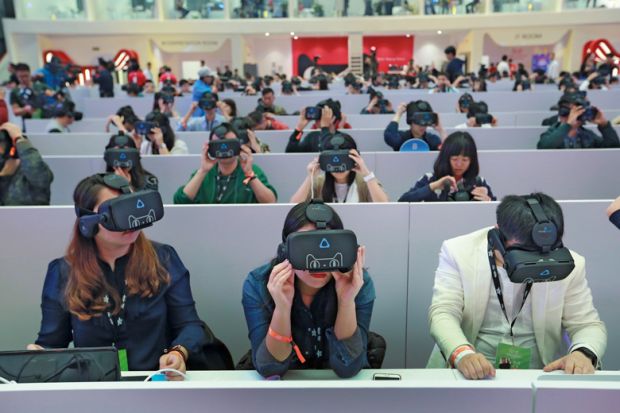Whether artificial intelligence tools could eventually supplant lecturers is a well-worn debate, but at one Hong Kong university, digital academics – including a certain Albert Einstein – are already taking their first turn as sages on the stage.
Students on the Social Media for Creatives course at The Hong Kong University of Science and Technology are taught by artificially generated characters in 30-minute segments, sandwiched between lectures from a real-life teacher. Currently, most of the 10 virtual academics appear in 2D videos, while a handful have been developed in 3D and can be viewed via virtual reality headsets.
The AI lecturers, who were introduced for the first time this semester, will cover topics including how social media catalysed the MeToo movement and its impact on recent US elections, with Einstein dropping in to discuss scientific research methods.
While much of the debate about the role of AI in higher education has focused on the reliability of information being shared by large language model-based tools such as ChatGPT, HKUST’s lecturers are not being let loose to do their research online just yet; instead, they are directed to information sources by real-life academics. The role of AI at the moment is to turn this information into a script in line with the academics’ given personas, although in time the university hopes to develop a question-and-answer function and the opportunity for deeper “interactions”.
Campus resource: Missing face-to-face interaction? Try becoming a ‘hologram professor’
Along with ChatGPT and Microsoft’s Copilot chatbot, other AI tools have been used to develop the appearances and stylisations of the teachers.
Pan Hui, professor of computational media and arts at HKUST and the project leader, said the innovation allowed AI to “subsidise some of the teaching duties”. His hope is that the approach will eventually be used more widely to help academics focus their time on research and helping students to improve critical thinking, rather than spending time on recounting basic information.
If some lecturing “can be replaced by AI, then we can [be] more involved in research, in the emotional education of the student…and help them to be more creative”, Professor Hui said.
“In the future there will be a more…personalised learning experience, enhanced [by AI],” continued Professor Hui, one that could “analyse the individual students for their strengths, weaknesses, learning style and progress to create…customised curriculums”.
“The teacher cannot offer you too much time,” he said, pointing out that AI was not bound by the same limitations.
A parallel research project is assessing the effectiveness of the AI-generated lecturers, with student feedback being gathered to judge how different appearances, accents and communication methods – as well as verbal and non-verbal cues – affect engagement. In what is perhaps a slightly depressing finding, reactions to date indicate that, despite HKUST’s goal of creating a diverse range of AI-generated lecturers, students prefer younger, more conventionally attractive teachers of Asian or Caucasian ethnicity.
However, Professor Hui said he was confident that AI teachers could be used to boost representation in the classroom, with repeated exposure to characters of different nationalities, backgrounds and cultures helping students to “accept that the world is very diverse”.
So far, external reactions to the project, and its goal of supporting real-life academics, have been mixed. Paul LeBlanc, the outgoing president of Southern New Hampshire University – a pioneer of online learning in the US – warned that faculty members might see digital instructors “as a threat instead of a possible aide”.
Helen Crompton, executive director of the Research Institute for Digital Innovation in Learning at Virginia’s Old Dominion University, said that AI lecturers could be used to strengthen higher education, allowing students to experience topics more immersively, such as learning from pioneers like Einstein and watching experiments that would be challenging to demonstrate in a real-world environment.
They could also reduce academics’ workload, particularly when it comes to administrative work and answering straightforward – and often repetitive – questions from students, such as about the syllabus. Potentially, AI teachers could also be better than humans at picking up early warning signs of struggling students.
But both Professor Crompton and Professor Hui were clear: AI lecturers should not be seen as replacements for real-life teachers and the emotional intelligence they bring to the classroom.
“AI should not make decisions, but it can extend and enhance our instruction,” said Professor Crompton.
Professor Crompton warned that research suggested most people viewing AI tended to focus on how realistic the technology was, as opposed to the actual content being shared. Dr LeBlanc agreed. “I wonder if these avatars will fall into the ‘uncanny valley’, in which they are just off enough to creep us out,” he said.
But, he continued of the project, “if it realises its goal of amplifying student learning and motivation, it will be a very valuable experiment.
“We need more experiments like this one and, I’d argue, bolder questions. How might we reinvent learning in more fundamental ways?”







